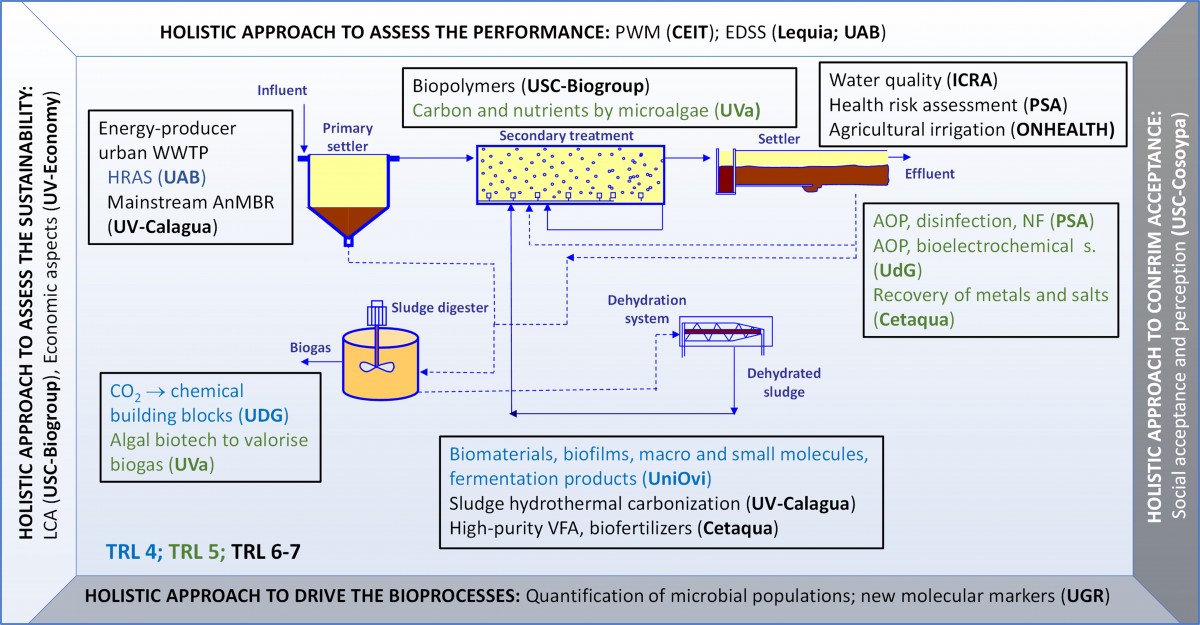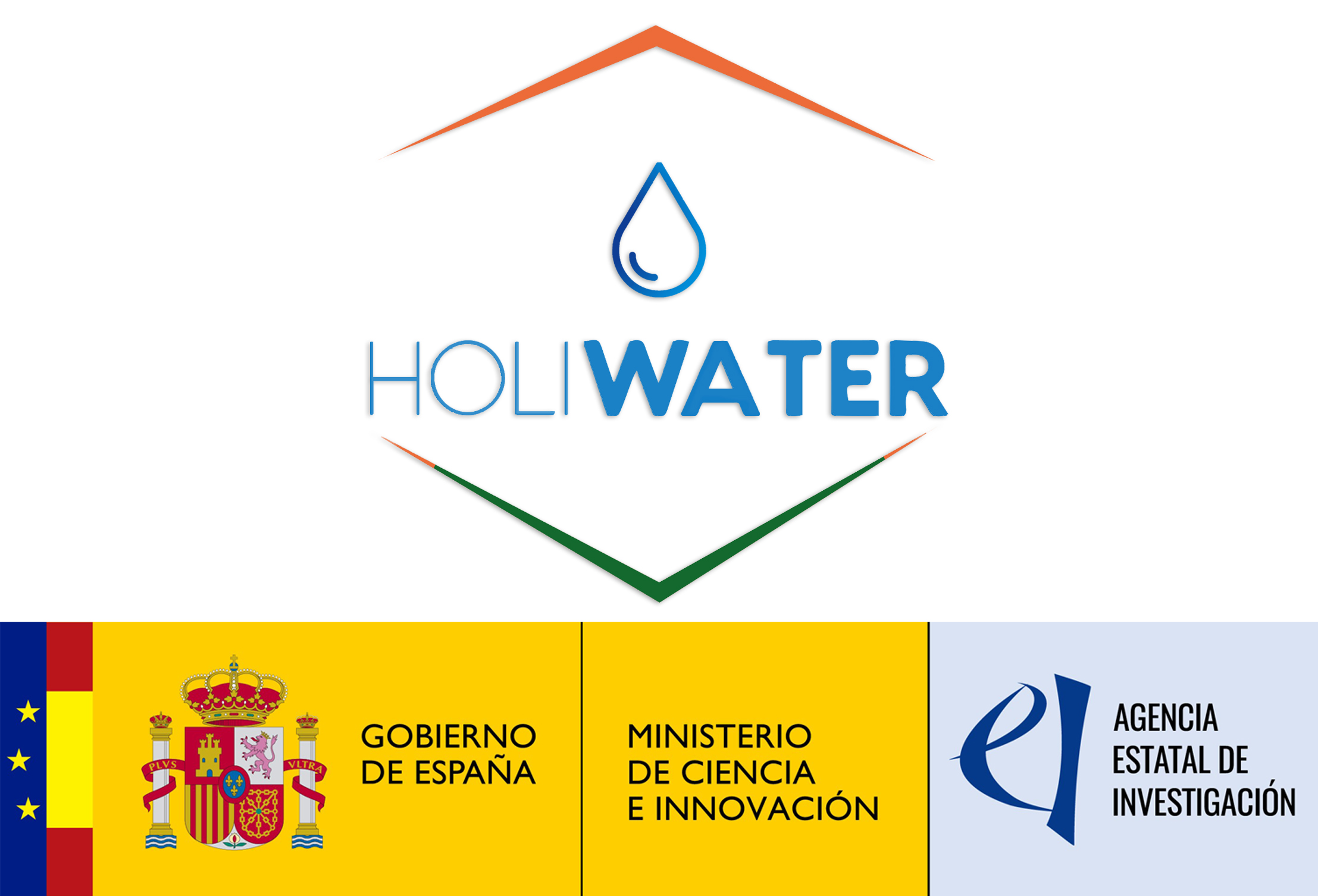The development of innovative technologies for resource recovery from wastewater and sludge is essential in a scenario of raw material depletion. Energy, clean water, nutrients, and chemicals can be extracted from wastewater. Besides the adequate technological developments, a new holistic and multidisciplinary perspective is needed to implement this strategy into Wastewater Treatment Plants (WWTPs) in terms of environmental and economic sustainability and social acceptance.
The aim of HOLIWATER is to promote the development and implementation of innovative technologies for the sustainable recovery of resources from wastewater and sludge components. A multi-disciplinary approach will be followed, from a plant-wide and holistic perspective. This integrative conception is possible within a network of highly experienced researchers in different disciplines, willing to promote close collaborations and knowledge-exchange.
As network of research, each partner will develop their own activities, while HOLIWATER will increase the value and visibility of results. The work plan includes scientific activities to discuss new project ideas (workshops and symposiums on disruptive topics), as well as other more technologically oriented to consolidate and up-scale the more mature processes. Training activities are planned for the scientific sector (international summer schools) and professional from industry (technical courses). The dissemination of results includes joint publications and a final conference for the industrial sector, promoting opportunities for technology transfer. Special attention will be paid to the dissemination to society of the progress achieved in the research areas of the network.
Consortium
A team composed by 14 expert groups in the field of technological, environmental, analytical, microbiological, economic and social knowledge.
|
PI |
Group |
Entity |
Expertise |
|
Anuska Mosquera |
BioGroup |
U. Santiago de Compostela |
Production of biopolymers; co-Anaerobic digestion of sewage sludge to enhance energy production; Selective production of volatile fatty acids; LCA |
|
Raúl Muñoz |
EnvTech |
U. Valladolid |
Microalgae-based WWT, odour treatment, biogas valorization |
|
José Mario Díaz |
TBR |
U. Oviedo |
Hydrolysis, separation and characterization of products, fermentation, preparation of biomaterials |
|
Alberto Bouzas |
CALAGUA |
U. Valencia |
Anaerobic technology; nutrients recovery through precipitation (struvite), membrane contactors (ammonium sulphate) and electrodialysis; process control |
|
Teresa Alvariño |
CETAQUA |
CETAQUA |
Resource recovery from urban and industrial wastewaters/sludges (volatile fatty acids, ammonium salts, phosphate-based fertilizers) |
|
Juan Antonio Baeza |
GENOCOV |
U. Autònoma de Barcelona |
Phosphorus, Sulphur, PHA and VFA recovery; Biomethanation; Energy producer WWTPs; Bioelectrochemical systems; Modelling and process control; DSS |
|
Isabel Oller |
TSA |
CIEMAT-PSA |
Technologies (based or not on solar energy) for WWT and reuse and recovery of added value substances. Elimination of microcontaminants, pathogens and antibiotic resistant genes/ bacteria. Análisis de riesgos |
|
Jesús González |
Microbiología |
U. Granada |
Molecular and bioinformatic techniques for analysis of microbial communities in urban and industrial WWT systems. Design of new molecular markers to analyze the dynamics of the key microbial populations |
|
Mira Petrovic |
Water Quality |
ICRA |
Advanced analytical methodologies for studying occurrence, fate and behaviour of emerging contaminants in water treatment and for reuse purposes |
|
Sandra Pérez |
ONHEALTH |
CSIC |
Quality of the treated wastewater and reused water |
|
José Manuel Sabucedo |
COSOYPA |
U. Santiago de Compostela |
Social perception and acceptance of recovered water and resources |
|
Eduardo Ayesa |
Agua y Residuos |
CEIT – BRTA |
Mathematical modelling and simulation of WWT processes; plant-wide modelling; process control; Computational Fluid Dynamics (CFD); P recovery |
|
Francesc Hernández |
Economía del Agua |
U. Valencia |
Efficiency analysis; Optimization models for WWT; Monetary valuation of environmental and social benefits in water reuse projects; Business plans |
|
Manuel Poch |
LEQUIA |
U. Girona |
Advanced oxidation and adsorption; membranes; bioelectrochemical systems; carbon dioxide conversion; environmental decision support systems; socio-natural systems; nutrient recovery |
The approach towards WWTP
Resources can be recovered from the sludge and water lines, as well as from gaseous streams.
Such technologies have to be implemented in wastewater treatment plants, where the interactions among unit processes have to be well understood. In addition, once the technological effectiveness and the environmental and economic sustainability of new treatment schemes have been confirmed, the success of its implementation strongly depends on social acceptance. This implies increasing complexity to wastewater treatment innovation.

Impact
The exchange of know-how and methodologies within the consortium will allow avoiding duplicities, accelerating the progress of research activities and analyzing jointly complementary technologies. Impact of the network will be maximized by dissemination activities to the scientific sector planned by joint publications and congress communications, and to industry through technical reviews and leaflets. Water innovation will be promoted by maintaining close contacts with the main stakeholders.




